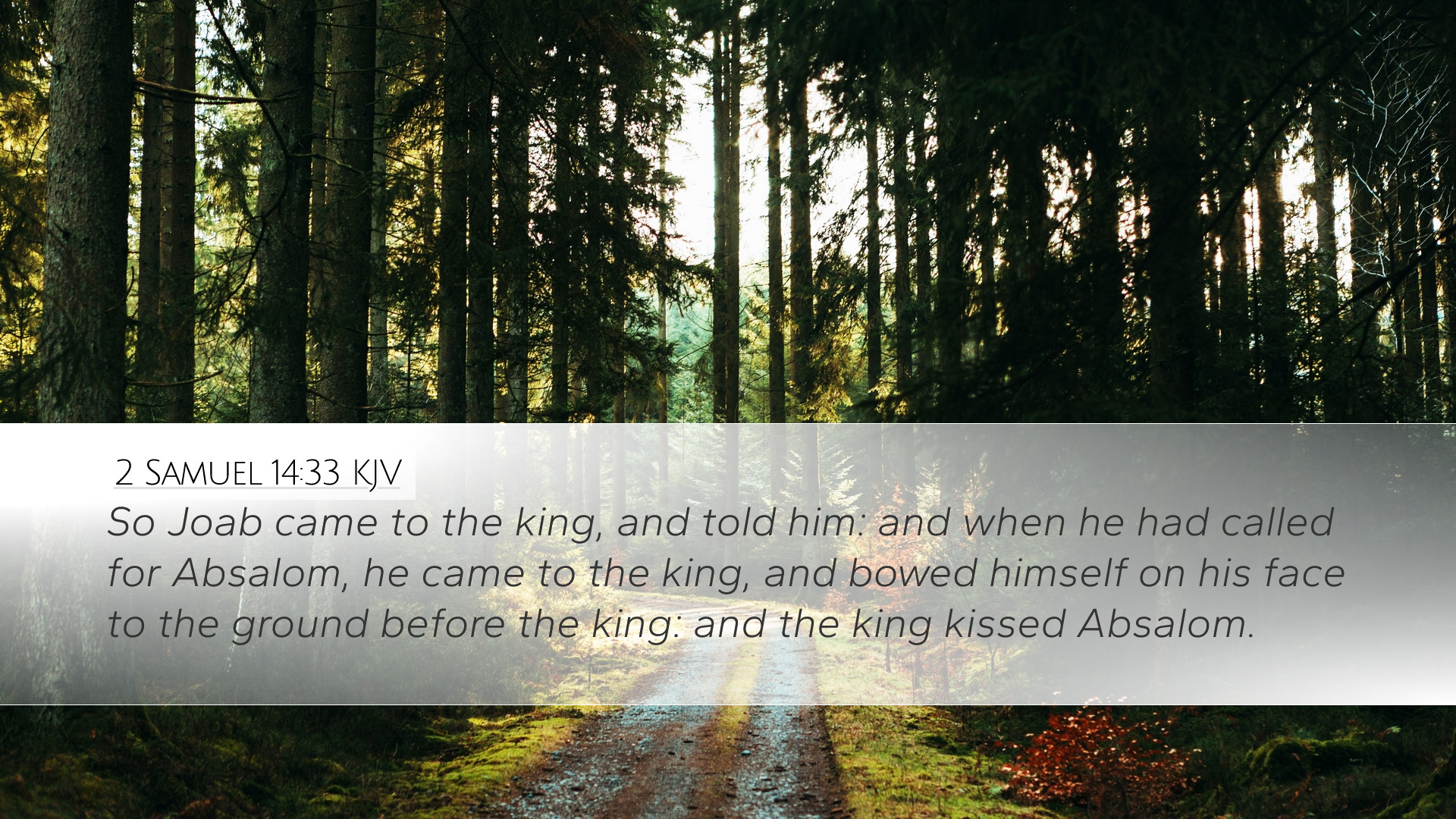Commentary on 2 Samuel 14:33
Verse Text: “So Joab went to the king and told him. And when he had called for Absalom, he came to the king and bowed himself on his face to the ground before the king. Then the king kissed Absalom.”
Introduction
This verse marks a pivotal moment in the narrative of David's reign, illustrating complex themes of reconciliation, familial loyalty, and the often tumultuous relationship between ambition and authority. Joab's role as mediator, Absalom’s approach to his father, and David's response all reflect deeper theological and social implications pertinent to understanding leadership and conflict resolution in a biblical context.
Contextual Analysis
The events leading up to this moment are steeped in familial conflict. Absalom, having killed his brother Amnon in vengeance for a grievous wrong, has been in exile. This extended separation reflects the overarching themes of sin and estrangement. The actions taken by Joab to bring Absalom back highlight the tension between justice and mercy inherent in the Davidic narrative.
Insights from Public Domain Commentaries
Matthew Henry's Commentary
Matthew Henry emphasizes the role of Joab as a strategist, suggesting that he orchestrated the return of Absalom not only for David’s sake but also to secure his own position. Joab’s actions can be viewed as politically motivated, as he seeks to stabilize David's reign amidst familial strife. Henry notes that Joab had “keen wisdom” in recognizing that Absalom’s presence might bring peace but also implies the complicated nature of such reconciliation which does not immediately resolve past grievances.
Reconciliation and Forgiveness
Henry elaborates on the significance of David's embrace of Absalom. The king’s act of kissing his son symbolizes forgiveness and restoration. It signifies that despite the grievous sin of Absalom, there lies a pathway toward grace—a theme echoed throughout scripture where reconciliation paves the way for healing relationships.
Albert Barnes' Commentary
Albert Barnes provides insight into the symbolism of Absalom bowing before David. He interprets this as an act of submission, indicating Absalom’s recognition of authority. However, Barnes also warns readers of the duplicity within Absalom’s heart, noting that despite appearing humble, Absalom’s ambitions foreshadow further conflict.
The Complexity of Human Relationships
Barnes discusses the intricacies of their father-son relationship, pointing out that the reunion, while outwardly peaceful, is fraught with unresolved tension. The act of kissing, though tender, should be juxtaposed with the underlying political machinations, emphasizing that human relationships within this royal family are steeped in grief and past sins.
Adam Clarke's Commentary
Adam Clarke focuses on the implications of Joab's intervention. Clarke draws attention to the perils of intermediary power dynamics, where Joab acts as both a servant of David and a manipulator of the future circumstances of the kingdom. He highlights that Joab’s motivations are complex, revealing a blend of loyalty to David and an eye to self-preservation in a politically unstable environment.
The Role of Intermediaries
Clarke views Joab as a critical figure in this narrative, one who understands the implications of Absalom's return for the political landscape. His strategic involvement illustrates how intermediaries can shape outcomes, reminding readers that influence within governance can lead to healing but also to deeper corruption.
Theological Themes
- Reconciliation: This verse emphasizes the biblical principle of reconciliation, providing a model for believers on how to navigate familial relationships marred by conflict.
- Authority and Submission: Absalom’s bowing signifies the struggle between authority and rebellion, a recurring theme in the life of David as a king.
- The Nature of Forgiveness: David’s act of kissing Absalom reflects the profound nature of forgiveness, portraying it as an active choice rather than a passive emotion.
- Political Intrigue: The context of the reunion presents the juxtaposition of personal affection against a backdrop of political strategy, reminding scholars of the intertwined nature of personal and national affairs.
Applications for Today’s Church
This narrative offers significant implications for church leaders and congregants alike. The dynamics of forgiveness, the necessity of reconciliation, and the complexities of leadership present valuable lessons. Modern-day pastors can draw from this text in exploring themes of grace extended even under difficult circumstances, the importance of humility in leadership, and the ethical responsibilities that accompany authority.
Conclusion
2 Samuel 14:33 serves as a rich text for exploration through the lenses of familial relationships, authority, and the multifaceted nature of reconciliation. Each commentator provides a unique perspective that enriches our understanding of the text, offering numerous applications for believers navigating their own complex relationships and leadership challenges in today’s world.


